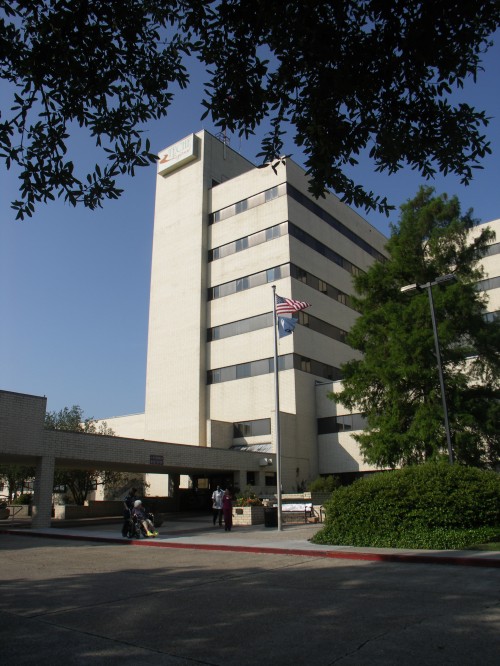
Medical business leads all industries in jobs
April 18, 2012
NSU’s Fierce Competitor
April 18, 2012Being included in a corporate network of hospitals does not stop employees at Teche Regional Medical Center from remembering that quality health care always has a local face.
From staff members with the longest employment records to the newest surgeons, keeping the needs and interests of their neighbors a priority has provided a winning formula.
“I’ve been here 38 years,” food service coordinator David Mouton said as he replenished food trays during a breakfast rush in the hospital’s 20-table cafeteria.
“We have people come in every day for themselves or to get something for someone else,” Mouton said of regular patrons making their way through the line – at that moment for a $2.60 egg, biscuit, meat and grits special – for selections from coffee to meat pies, between the hours of 7 a.m. to 1:30 p.m.
“There is an area in the back where sometimes they have meetings,” he said of the common area that reflects a casual, friendly yet professional atmosphere. “They love the food. They come from their houses to eat here.”
The cafeteria might be limited to six and one-half hours of availability, but the same welcoming atmosphere is not lost during the remaining hours of every day in the seven-story 198,518 square foot and 165-bed facility.
“We are a for-profit organization and we are owned by LifePoint Hospitals out of Nashville, Tenn.,” Teche Regional Medical Center Marketing and Business Development Director Sabrina Roy said.
Roy admitted to having to remind people that this medical center is part of a corporate 53-hospital network across 18 states, although it did originate as the 50-bed Lakewood Hospital in 1955, and operated as a public hospital service district for 47 years.
Province Hospitals gained a lease and turned the public facility into a private institution in 2002. That was also when the name changed from Lakewood to Teche Regional.
Province merged with LifePoint in 2005, and seven years later Teche Regional Medical Center is recognized as a full-service hospital, and one of the largest in its corporate group.
Roy noted that while many hospitals across the nation are undergoing cuts, this facility is one that is undergoing structural expansions, bringing on staff and increasing services offered.
When Leonard J. Chabert Medical Center in Houma was forced to terminate personnel and cut its labor and delivery floor because of state budget cuts, Teche picked up some of those people and announced it would help with uninsured women that had previously depended on the public hospital. “We were able to hire a couple of nurses,” Roy said. “I don’t know if we have any deliveries from [Chabert].”
Teche Regional Medical Center prides itself on having emergency facilities, ambulatory services, cardio-health specialists, general surgery, behavioral health, women’s services, intensive care units, physical and speech rehabilitation resources, radiology and therapeutic medicine.
The Teche medical staff consists of general and vascular surgeons, obstetricians/gynecologists, cardiologists, pediatricians, internal medicine professionals, family practitioners, otolaryngologists, orthopedists, radiologists, pathologists, psychiatrists, emergency medicine physicians and anesthesiologists.
The newest professional addition to Teche medical resources is Dr. Christopher Stewart, of First Orthopedics of South Louisiana. Having been associated with the hospital only a matter of weeks, Stewart is a resource through whom services are expanded.
Stewart has introduced partial joint replacement at Teche for cases when a full replacement might not be needed, or would be considered too drastic for a patient’s condition. Common procedures along this line include reverse shoulder replacement, partial knee replacement and anterior hip replacement.
“These procedures are less invasive, less painful and have a much less recovery time compared to total replacements,” Stewart said. “There are many times when a total replacement is not necessary, and now these procedures are an alternative to that.”
“There are many services we offer,” Roy said. “We might not do open heart surgery, but we can take you where they do.”
The marketing director was not on staff during the switch from being a public hospital to corporate facility, but has recognized the results of that change. “We never made money when we were a public hospital,” she said, but pointed out that they still treat a significant number of charitable cases. “Now, by being part of a corporate network, we have resources to be able to offer more for the public.
“One thing about LifePoint is that their hospitals are all in small communities,” Roy continued. “That helps keep the community feel to them.”
LifePoint lists more than $3 billion in revenue. It is the sole hospital provider in most communities where it is present and, in 2011, became the only private organization in the country chosen by the U.S. Department of Health and Human Services to be included in the Hospital Engagement Network Partnership for Patients initiative – a nationwide public-private collaboration to improve the quality, safety, and affordability of health care for all Americans.
The LifePoint network has more than 23,000 employees and nearly 3,000 physician partners.
In addition to Teche, LifePoint’s Louisiana locations include Acadian Medical Center in Eunice, Minden Medical Center in Minden, Mercy Regional Medical Center in Ville Platte and River Parishes Hospital in LaPlace.
Roy said doing business as a for-profit hospital relies heavily on patient satisfaction, and according to new federal laws, personnel in corporate medical facilities are having their pay measured by patient satisfaction. “We have a scale we will go by, but much of our compensation will depend on how satisfied we keep our patients,” she said.
Roy and Mouton each confirmed the high employee turnover rates that commonly occur in medical professions. They also agreed that as corporate hospitals work to keep staffs and patients satisfied, they offer greater stability for all involved.
“I love it here,” Mouton said with a voice representing a familiar face. “I like the people and the atmosphere. It is just a wonderful place to work.”
Being the only corporate-owned hospital in the Tri-parish region does not stop Teche Regional Medical Center from being community oriented. From full-service health care to public awareness programs, the Morgan City facility is adding staff and services to meet local needs.










